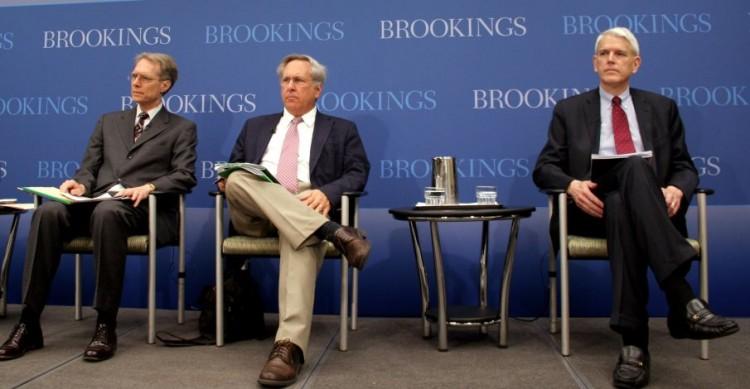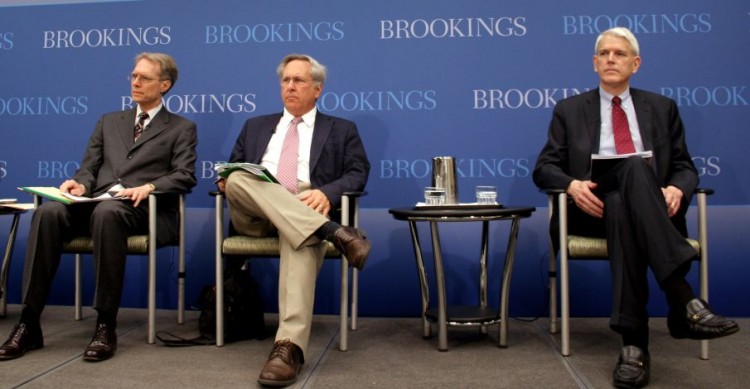WASHINGTON—The contentious issue of missile defense is reemerging between Washington and Moscow. Russia worries that NATO’s later missile defense plans at the end of the decade will pose a threat to its strategic missile defense. So far, U.S. assurances that the missiles are not aimed at Russia have not been enough to eliminate those fears.
At the end of 2010, Russia agreed to explore a cooperative defense arrangement, seeking a “legal guarantee” that U.S. arms would not be directed against its strategic ballistic missiles. This guarantee would have the U.S. limit the number, velocities, and locations of its missile defense interceptors.
But the two nations have yet to reach an understanding, and a strong Republican opposition in the U.S. Senate stands in the way of Russia getting what it wants. The Obama administration is trying to get the Russians to accept a political assurance in lieu of a legal guarantee to not direct U.S. and NATO missile defenses against Russian strategic deterrent.
On May 17, the Brookings Institution hosted a discussion on the prospects for cooperative resolution of Europe’s missile defense. The new Brookings’ Arms Control series released a 37-page paper, “Missile Defense: Cooperation or Contention,” that makes the case for NATO-Russia agreement on missile defense cooperation.
The paper’s author Steve Pifer argues that Russian participation could ideally provide several benefits for Europe’s missile defense. Missile defense could become an asset rather than a liability on U.S.-Russia and NATO-Russia agendas and provide a stronger missile defense of Europe, says Pifer, who is director of the Arms Control Initiative at Brookings and former ambassador to Ukraine.
Some suggest that President Vladimir Putin is simply holding off until after the U.S. presidential election before committing to anything. Pifer acknowledges that a 2012 cooperative defense agreement “appears all but impossible in 2012.”
Limited Missile Defense
The U.S. missile defense strategy has seesawed through the decades, but offense has always developed faster than defense. President Ronald Reagan hoped that his Strategic Defense Initiative (SDI) would provide the U.S. the ability to defend against a large-scale Soviet ballistic missile attack. But by the end of the 1980s, it was clear that “defensive technologies were far more difficult to develop than anticipated,” and the costs were excessive, writes Pifer.
By the George H.W. Bush administration, the scope of SDI was scaled back to protect against a limited number of offensive weapons, which, according Pifer, remains U.S. policy. Threat focus narrowed in 1998 to rogue nations—Iraq, Iran, and North Korea—by a commission headed by Donald Rumsfeld.
Writer Greg Thielmann points out that the Rumsfeld Commission predicted that that each of these nations could have ICBMs by 2003.
Although alarmist, the Rumsfeld Commission report provided an inducement to Congress to pass the National Missile Defense system in March 1999 calling for a homeland defense against “limited missile attack.” At that time, it was understood that U.S. missile defense could not “effectively defend against a deliberate, full-scale Russian or Chinese attack,” said Thielmann, who is currently at the Brookings’ Arms Control Association, and a previous U.S. Foreign Service Officer.
Thielmann observes that in 2012 North Korea and Iran still don’t have long-range, nuclear-tipped missiles the Rumsfeld Commission predicted.
The U.S. Plan
As an alternative to previous administration’s plan, the Obama administration proposed the European Phased Adaptive Approach (EPAA) to missile defense, which it hoped would be more acceptable to the Russians, because it is tied to actual rather than theoretical ballistic threats, according to Thielmann.
EPAA’s phase 1, which is in place now in the eastern Mediterranean Sea, installed the SM-3 Block 1A missile interceptor with the Aegis SPY-1 radar that is capable of tracking a large number of ballistic missile targets simultaneously. It has the capability of intercepting “existing Iranian short-and medium-range ballistic missile warheads,” writes Pifer.
The Russians voiced concern for phase 4 at the end of the decade. Then EPAA will have the SM-3 Block IIB; its burn-out velocity 5 or more kilometers per second is much greater than the 3 kilometers per second of the Block 1A.
The Russians regard this burn-out velocity as a threat to its strategic deterrent, said David Hoffman, contributing editor at the Washington Post and Foreign Policy Magazine, who has interviewed several retired Russian generals.
According to Pifer, the SM-3 Block IIB will have the capability of intercepting medium and intermediate-range ballistic missile warheads and some capability against ICBM warheads. It would likely be deployed in Poland.
The Russians don’t like the location of sites in the Northern Seas and close to Russian borders in Romania and Poland, Hoffman said.
“We are making the Russians uncomfortable” by bringing missile defense back to discussion, said Hoffman. He emphasized that they are “not prepared technologically to compete on missile defense.”
“It would behoove us to be sensitive to their mindset,” even if they are sometimes a little bit irrational and paranoid, he said.
Cooperation Obstacles
The kind of “legal” agreement Russia seeks is a non-starter in the current political climate, though Putin seems to have backed off a bit. Immediately after taking office on May 7, he changed his words to “firm guarantees.” But a Russian agreement involves setting limits on numbers, velocities, and locations of missile defense interceptors.
Earlier this month in the Wall Street Journal, Republican Senator Jon Kyl wrote that, “President Barack Obama can’t offer any ‘legally binding’ guarantee, because when he sought ratification of the New Start Treaty in 2010 he promised to accept no limits on U.S. missile defenses.”
Kyl, whom Republican senators defer to on defense matters, said he strongly opposes the president offering political assurances of the sort that Obama suggested to Russian President Dmitry Medvedev. A hot mic in Seoul on March 26 broadcast President Obama saying he would have “more flexibility” after the election.
But Kyl says that offering political assurances “would be a serious mistake…The right to self-defense is not one for which we must negotiate.”
Both Thielmann and Pifer say the Republican leadership takes support for strategic missile defense as an article of faith. “Every policy shift or defense reduction is judged according to whether it implies a failure of commitment to the cause of strategic missile defense,” writes Thielmann.
All three speakers stressed that Kyl’s position fails to appreciate the advantages of Russian cooperation in Europe’s missile defense.
“The primary Russian contribution to a cooperative missile defense system with NATO would be early warning and tracking data from Russian radar at Armavir and the Russian-operated radar at Gabala,” Pifer writes.
Pifer said these radars would likely provide earlier warning and tracking data of missiles from Iran than the U.S. radar in Turkey.
Pifer also mentioned that U.S. and Russian officials in 2011 agreed on a jointly-manned “data fusion center and a ”planning and operations center.” This kind of cooperation would go a long way toward defusing mistrust and misperceptions.
The U.S. could show more flexibility if the U.S. or NATO “choose not to deploy the SM-3 Block IIB interceptor if it were clear that Iran was not making progress toward achieving a longer-range missile capability,” Pifer writes.
The two nations are still talking, but for now things have stalled. President Putin is not expected to come to the NATO summit this week in Chicago, so the matter is not likely to come up any time soon.
The Epoch Times publishes in 35 countries and in 19 languages. Subscribe to our e-newsletter.






